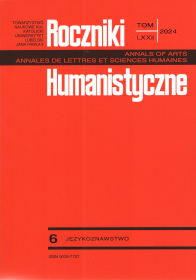Students’ Multilingual Experiences With Online Machine Translation: Implications for General Language Use
Students’ Multilingual Experiences With Online Machine Translation: Implications for General Language Use
Author(s): Katarzyna Klimkowska, Konrad KlimkowskiSubject(s): Social Sciences, Language and Literature Studies, Education, Foreign languages learning, Translation Studies
Published by: Towarzystwo Naukowe KUL & Katolicki Uniwersytet Lubelski Jana Pawła II
Keywords: neural online machine translation; DeepL Translator; plurilingualism; text mediation
Summary/Abstract: This article discusses how online machine translators (OMT) can influence the way people use general language or languages. The latter distinction has to do with the fact that contemporary lifestyles turn language users into plurilingual communicators. Online shopping, travelling abroad or social media often require at least some degree of plurilingual text mediation skills. Irrespective of foreign language competences, a lot of plurilingual communicators seek OMT support in making sure their messaging with international partners is correct and effective. The article discusses research results concerning how a selected group of BA and MA students in education use machine translation for day-to-day plurilingual communication tasks. We asked them about the relation between machine translation, language learning and language use. We give some insight into the machine translation engine DeepL Translator, which can effectively be used in support of plurilingual text mediation. The article also contains basic educational implications for why and how to make OMT part of foreign language curricula.
Journal: Roczniki Humanistyczne
- Issue Year: 72/2024
- Issue No: 6
- Page Range: 91-103
- Page Count: 13
- Language: English

